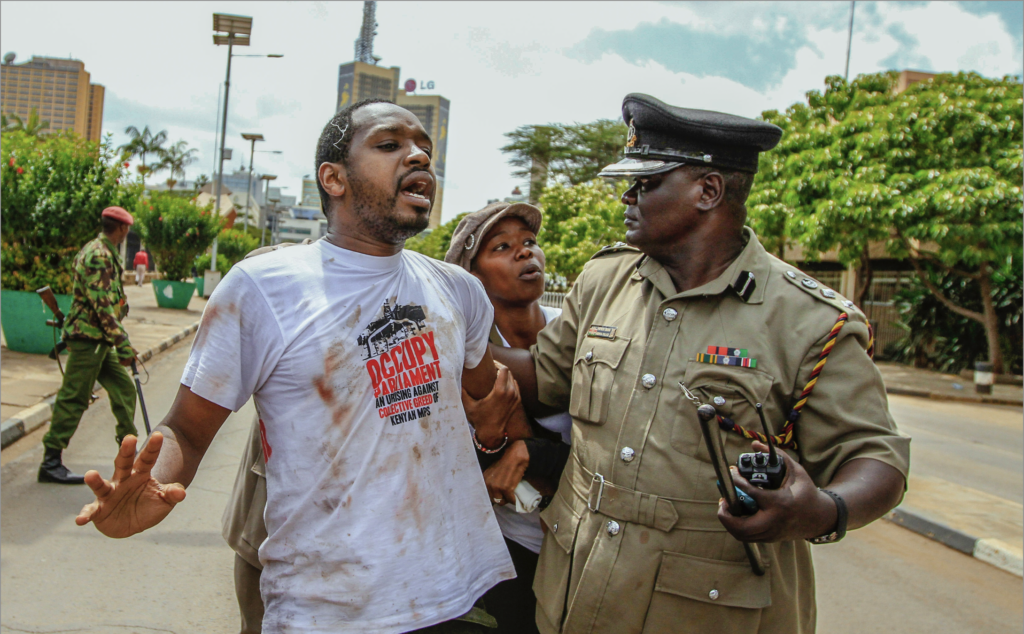
Boniface Mwangi, a prominent human rights activist in Kenya, has been detained by police on charges of inciting violence after a dramatic raid by a group of masked individuals at his home. His wife reported the incident to the BBC, stating that six masked individuals forcibly took him away, raising serious concerns about the methods used to apprehend him.
Mwangi’s detention comes shortly after he called for an anti-government protest during a marathon event in Nairobi scheduled for Sunday. His activism has previously involved rallying citizens against government policies, particularly regarding the rising cost of living and police brutality, issues that have become increasingly pertinent under President William Ruto’s administration.
Police spokesperson Resila Onyango confirmed to local media that Mwangi is in custody but provided no further details about the circumstances of his arrest. His supporters have reacted with outrage, demanding his immediate release and decrying the violent methods employed in his apprehension.
In the lead-up to his arrest, Mwangi had been actively engaging the public on social media platform X (formerly Twitter), using hashtags such as #RutoMustGo and #OccupyStanChart to promote the protest. He encouraged participants to wear clothing in the national colors and bandanas emblazoned with the message “RutoMustGo,” urging them to share protest chants online. His call to action included a reminder for participants to “stay calm and peaceful and have fun!”
This latest incident marks just one of many instances in which Mwangi has faced arrest and detention throughout his activism. His calls for protests have been seen as critical attempts to maintain pressure on President Ruto, especially as public dissatisfaction grows regarding the economic situation and government accountability.
According to Mwangi’s wife, Njeri Mwangi, the activist was taken from their home in Machakos County, approximately 40 kilometers (25 miles) east of Nairobi, during the early hours of Sunday morning. She described how a group of five masked men and one masked woman, all dressed in plain clothes, forcibly took her husband, handling him roughly during the incident.
“They allowed him at least to dress up, and then they walked him out,” she recounted, highlighting the aggressive nature of the operation. Hours later, police confirmed that he was being held at a police station in downtown Nairobi, raising alarms about the safety of individuals involved in dissenting political activities.
Both Mwangi’s legal team and his wife stated that he is facing charges of incitement to violence, which he firmly denies. This latest development in Mwangi’s ongoing activism illustrates the tense political climate in Kenya, where dissent against government actions is met with increasing repression.
President Ruto, who was elected in 2022 on a platform aimed at uplifting the “Hustler Nation”—a term referring to poor and unemployed citizens, particularly the youth—has found himself under mounting pressure. Public discontent has surged due to rising living costs and the government’s proposed tax increases. After facing mass protests in June and July, Ruto retracted his tax plans and made moves to include the main opposition party in his government to quell the unrest.
Adding to the political turmoil, Kenya’s parliament recently impeached Ruto’s deputy, Rigathi Gachagua, following accusations of fueling ethnic divisions and breaching his oath of office. Gachagua has denounced the impeachment as a “political lynching,” further complicating the political landscape.
Despite the challenges, President Ruto maintains that he is committed to governing in the best interest of all Kenyans and improving the economy. However, incidents like Mwangi’s detention suggest that dissenting voices are increasingly being silenced, raising concerns about the future of civil liberties and political expression in the country.
As calls for Mwangi’s release continue to grow, the situation highlights the ongoing struggle for human rights and democracy in Kenya, where activists face significant risks for challenging the government. The international community is watching closely, and the response to this incident may have implications for Kenya’s political climate and civil society’s ability to operate freely.






